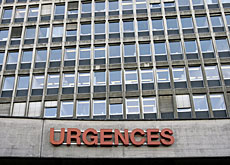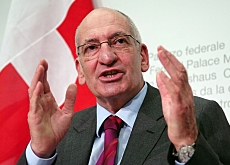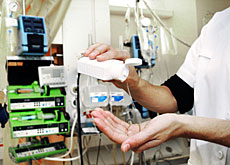Plan for hospital reform causes headache

Proposals for a reform of Swiss hospitals, under discussion in parliament this week, are raising eyebrows in the healthcare sector.
The main players, including hospitals, health insurers, cantonal authorities and patient organisations, are concerned that they may have to foot the bigger part of the bill for the reform which has dragged on for seven years.
The planned revision foresees the introduction of a classification system for hospital patients, known as Diagnosis-related Groups (DRG), in an effort to increase efficiency and transparency and reduce increasing health costs.
Hospitals account for about 35 per cent of the total healthcare expenditure.
The reform, which aims to make savings of SFr500 million ($413 million) annually, also includes redefining a funding scheme between the country’s cantons and health insurers, as well as boosting financial support for private hospitals and increasing cooperation.
The country’s cantonal authorities, which enjoy wide-ranging autonomy in hospital matters, are in favour of the reform. But their concern is that they will have to bear the brunt of the new system.
“We are in favour of introducing standard rates for treatment in hospitals in an effort to improve cost transparency and quality of treatment,” said Michael Jordi of the Conference of Cantonal Health Directors.
But a plan to make private clinics eligible for more subsidies and to use cantonal taxpayers’ money to give unrestricted access to hospitals across the country has fallen on deaf ears.
“The move lessens the burden for health insurers,” Jordi told swissinfo.
“Bloody exits”
For his part, Peter Marbet of the umbrella organisation of health insurers defends the interests of his sector.
“Under the new funding system between the insurance companies and the cantons, patients could end up paying more,” he warns.
He welcomes the introduction of DRG as a “sea change” because it allows direct comparisons between individual hospitals and is likely to shorten hospital stays of patients.
Marbet is convinced that the reforms will not result in a wave of cases known as “bloody exits” – when patients are forced to cut short their hospital stay and subsequently suffer medical complications.
He points to experience gathered in other countries, including the United States, Australia and Germany, over the years.
In a similar vein, the Swiss hospital association (H+) – representing the country’s 380 public and private clinics – says it supports measures to improve quality control in hospitals to avoid such cases.

More
Conference of Cantonal Health Directors
Data protection
But H+ blames the insurers for blocking reform efforts in the hospital sector. The association says health insurance companies have refused to act before a decision is taken at a political level.
H+ has also criticised the insurers’ demands for access to patient files, calling it unrealistic and against data protection regulations.
The nursing association highlights the dangers of rigorous cost saving measures at the expense of patients.
“We are in favour of reform, but it is wrong to oblige patients who can’t afford extra insurance coverage to suffer the consequences,” says the association’s Lucien Portenier.
swissinfo, Urs Geiser
The House of Representatives is debating the latest bill on hospital reform this week. The Senate discussed the reform a year ago.
Hospital costs account for more than a third of the total health expenditure.
The debate comes ten days after voters rejected a proposal for a single health insurance company and health premiums based on income and wealth.
Hospital costs 2005 (comparison 2001):
Total costs: SFr17.2 billion (+18.3%)
Cases: 1.4 million (unchanged)
Average stay: 11.7 days (-7.6%)
Staff: 125,703 full-time jobs (+7.9%)
109,400 people lived in homes for old people, disabled and addicts (+5,000)

In compliance with the JTI standards
More: SWI swissinfo.ch certified by the Journalism Trust Initiative




You can find an overview of ongoing debates with our journalists here. Please join us!
If you want to start a conversation about a topic raised in this article or want to report factual errors, email us at english@swissinfo.ch.